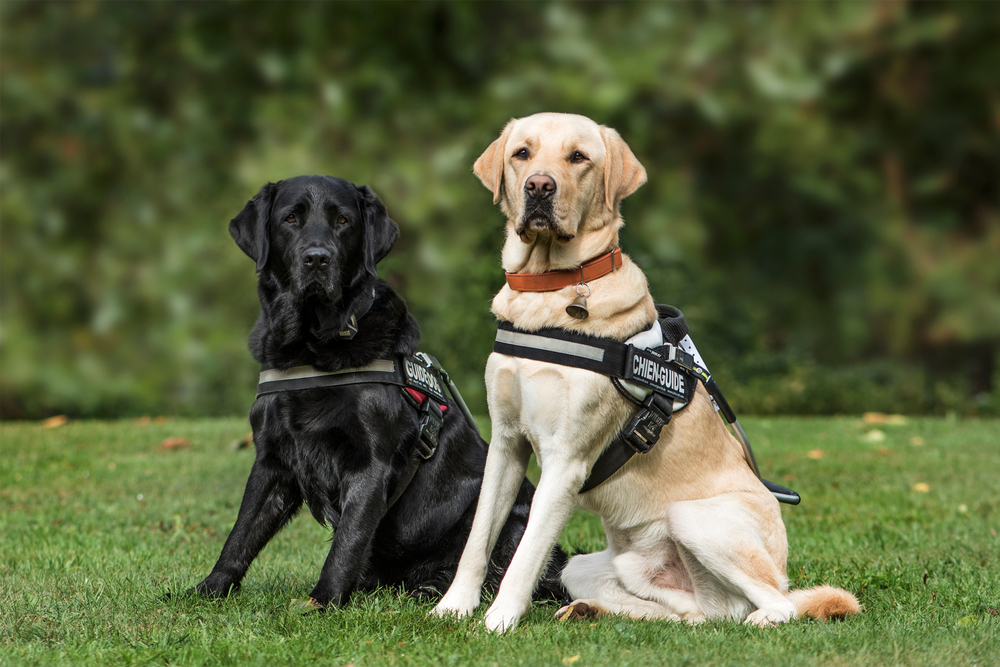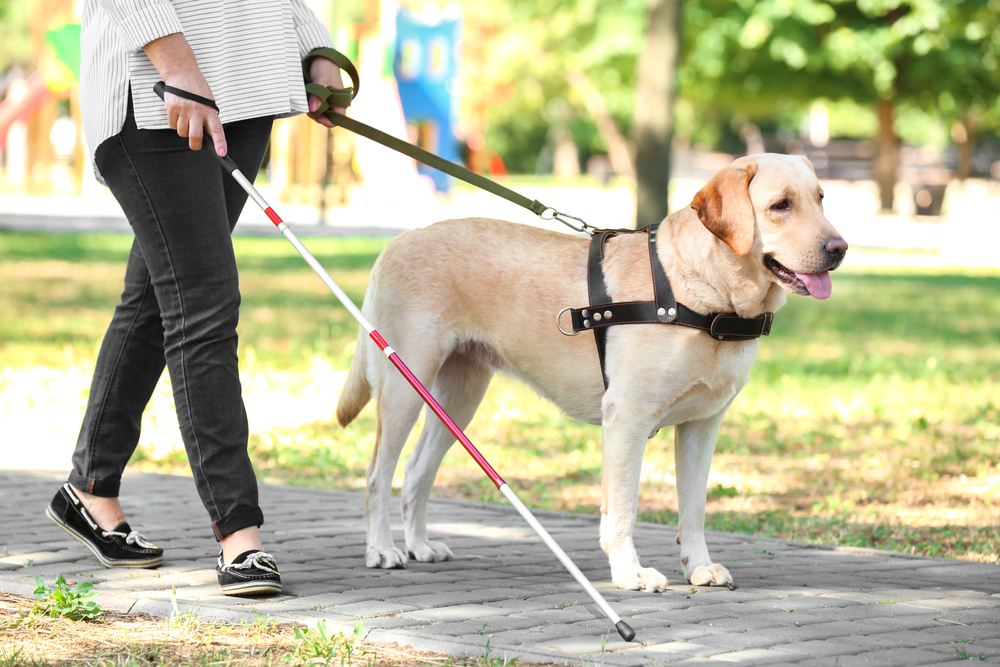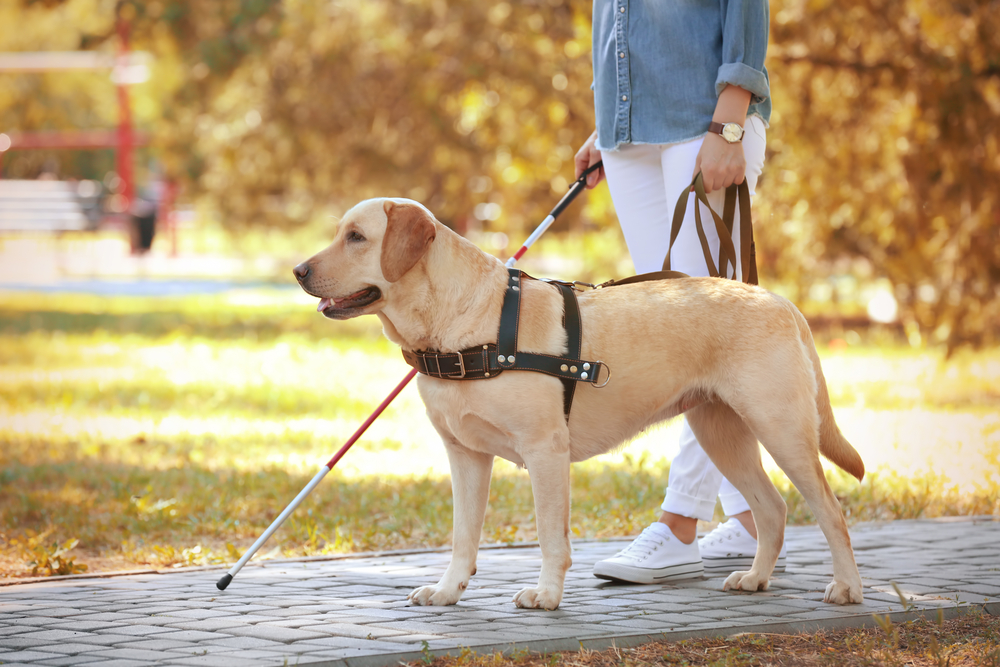Our canine companions are more than simply our best friends. They’re also our confidants, not to mention members of our family. For some people, dogs are an essential part of their ability to live an independent lifestyle. Guide dogs, colloquially known as “seeing-eye dogs,” are highly trained dogs who work to assist people living with disabilities. Dog lovers appreciate their furry besties every day, but we think these hardworking pups deserve an international day of recognition for all they do.
Fortunately, we’re not alone in that sentiment. Let’s take a closer look at International Guide Dog Day and learn about five incredible non-profit organizations that need your support to continue their inspiring and important work.

How International Guide Dog Day got its start
Founded in 1989, the International Guide Dog Federation (IGDF) “is comprised of 99 member organizations, whose purpose is to serve people who are blind or have low vision around the world, by training and providing Guide Dogs.” Created by the IGDF, International Guide Dog Day was first celebrated in 1992, and it’s been celebrated every year since on the last Wednesday in April.
5 nonprofit guide dog charities you should know about
There’s a common misconception that any guide dog will fit effortlessly into their new human’s life, but that’s simply not the case. According to the American Kennel Club (AKC), “Guide dogs are very carefully paired with their handlers. Everything from a person’s lifestyle, hobbies, activity level, family, living arrangements, and other pets go into the pairing process when a person applies for a guide dog through a non-profit organization.” Here are five of our favorite non-profits you can support right now.
Guide Dogs for the Blind
With an impressive 4 out of 4 stars on Charity Navigator, Guide Dogs for the Blind (GDB) is one of the most trustworthy charities out there. Founded in 1942, GDB has graduated over 16,000 guide dog teams in the United States and Canada. In addition to providing a skilled guide dog, GDB also offers post-graduation support, financial assistance for veterinary expenses, and personalized training…all free of charge. Surprisingly, GDB isn’t government-funded. The organization accomplishes all of this with the help of generous donors and volunteers.

The Guide Dog Foundation
Listed as a “Top-Rated Charity” by CharityWatch, the Guide Dog Foundation (also known as the Guide Dog Foundation for the Blind) boasts an A-grade score. The Guide Dog Foundation for the Blind was founded in 1946 with a straightforward mission: providing guide dogs to the blind or visually impaired at no cost. Not only has the Guide Dog Foundation trained guide dogs for over 75 years, but the foundation has branched out, offering service dogs to those with other disabilities.
Gallant Hearts Guide Dog Center
While Gallant Hearts has only been on the scene since 2010, this Mississippi-based non-profit organization holds a perfect score on Charity Navigator’s website. Gallant Hearts Guide Dog Center was founded by Rebecca “Becky” Floyd and Kathie Curtis after Ms. Floyd, who is blind, retired from her position as Executive Director of the MS Protection and Advocacy System in nearby Jackson, Mississippi. She now works as Executive Director for Gallant Hearts. Kathie Curtis, the retired Director of Youth Ministry for the Catholic Diocese of Jackson, serves as the Director of Kennel Operations & Puppy Program for Gallant Hearts.
The Seeing Eye
Founded in 1929 by Morris Frank and Dorothy Eustis, America’s oldest guide dog foundation celebrated its 90th anniversary back in 2019. As well as breeding and raising puppies to become guide dogs, the Seeing Eye also works closely with the blind, instructing them on how to care for their guide dogs. Additionally, the Seeing Eye is heavily involved in research into canine health and development, but their work doesn’t end there. The experts at the Seeing Eye also provide education to the public and make recommendations on public policy, all while earning a “Give with Confidence” rating from Charity Navigator.
Guiding Eyes for the Blind
Based in New York State, Guiding Eyes for the Blind specializes in breeding and training guide dogs. With an average of roughly 12 students per class, handlers learn how to work with their guide dogs in a relaxed setting that offers plenty of one-on-one attention. Guiding Eyes was founded by Donald Kauth in 1954 and has since graduated nearly 10,000 guide dog teams. As an accredited member of the International Guide Dog Foundation (IGDF), Guiding Eyes meets global standards while maintaining a solid rating on Charity Navigator.

When it comes to donating your time and resources, you want to make sure you’re supporting an ethical charity. Each of the wonderful non-profit organizations on our list has been vetted for transparency and accountability, so you can feel good about donating to a top-notch charity that genuinely improves the lives of the blind and visually impaired.



